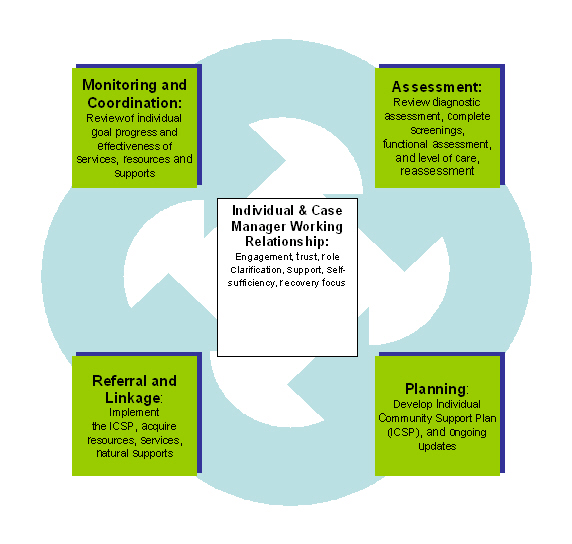Lesson 1: What is Case Management
Attention
Katherine Campbell Director, Dryden Area Family Health Team
To view this video on YouTube click HERE
Learning Outcomes
Upon completion of this lesson's material, students will be able to:
- Identify the purpose of case management and the different levels of case management.
- Based on a case study, demonstrate the abilty to conduct an initial assessment and tretment plan
Teaching
What is Case Management?
Case management (CM) is a systematic approach to help meet client needs. CM is grounded in Psychosocial Rehabilitation so it is important to review the basic Goals, Values, Principles, and Practices of Psychosocial Rehabilitation (PSR).
Click HERE to download the PSR Goals, Values, Principles, and Practices Document
Basic Processes in Case Management
There are 4 basic processes that are ongoing throughout the CM cycle of services:

Each of these processes represents an ongoing cycle of working with a client for the duration of the working relationship. Each step is also conducted in such a way as to embody the PSR Values.
At any given time various goals that our clients have will be somewhere in this cycle...so, one goal may be at the assessment phase, which another goal might be at the referral phase.
It is important to remember that CM often does not include the provision of direct services. Instead the CM works as a resource coordinator to empower the client to access the needed services. Sometimes the client needs multiple services. The Case Manager can help the client by letting them know of sources that provide multiple services.
CM is also very pragmatic...it tends to focus on what can be done with the alloted time and resources that are available.
Assessment
Lesson 1 Discussion
How can each of the steps/stages in the Case Management (CM) process embrace the Psychosocial Rehabilitation (PSR) Values? What are some challenges that some CM practitioners may face in making sure that the CM process DOES reflect PSR Values?